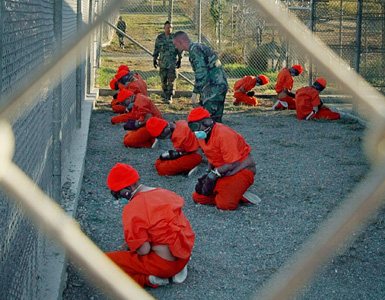
WASHINGTON – Worldwide intimidation of journalists, up to and including unsolved murders, is rising, a panel of experts on the issue warns.
And the United States, despite its free press traditions and its constitutional protections, rarely protests or raises the issue, the panel adds.
Indeed, the U.S. set a counter-example by letting its military round up 14 journalists in Iraq and Afghanistan during the fighting in those two nations. It jailed them with other “terrorists,” on unspecified charges, at the infamous Guantanamo Bay prisoner center on the island of Cuba, the panel notes.
And other nations, which all have less protection for journalists, took their cue from those detentions and other anti-journalist actions by U.S. administrations.
The Committee to Protect Journalists, a non-profit press freedom watchdog group, convened the panel – Frank Januszi of Amnesty International, Mohamed Keita of CPJ’s African program and Mark Feldstein, a longtime network news foreign correspondent who now teaches at the University of Maryland – on March 12.
CPJ also issued a book, with details, on governmental campaigns to curb media, intimidate journalists, censor news – including the Internet – and allow killings of reporters, with virtually no investigation.
Governments imprisoned at least 231 journalists in 2012, with 61 in Turkey alone. And 66 were killed, 28 of them in Syria.
The “war on terror” is the ostensible excuse for governmental arrests and crackdowns. Some 140 governments, including the U.S., enacted “anti-terrorist” laws since the Sept. 11, 2001, al-Qaeda attacks on New York and Washington.
But many of those laws are vague, as are the “terrorism” or “anti-state activities” charges that governments use to arrest media members, repress dissent and subdue or stop questions, the panelists said.
And governments often use the vague terrorism language to punish reporters who write stories questioning official policy or reporting on groups, such as the Turkish Kurds, whom those governments consider terrorists. The governments consider reporting to be aiding and abetting the terrorists, the panel agreed.
The panelists’ descriptions of governmental actions against journalists, and governments’ jaundiced view of independent reporting, including reporting as a form of treason, echo what unionists suffer, particularly in war-torn nations.
In Colombia, for example, unionists are routinely threatened, kidnapped and murdered. Nineteen were murdered in Colombia last year, a pro-worker Colombian investigating senator told PAI in February. CPJ reports one Colombian journalist was murdered in 2012, too.
There are eight unsolved journalist murders in Colombia and 3,000 murders of unionists over 30 years. Right-wing paramilitaries have confessed to 450 of the unionist murders there, to get lighter sentences from a Truth and Justice Commission.
The U.S. should be crusading constantly for open media and against such repression, the panelists said, both raising the issue publically and in government-to-government discussions between national leaders. It isn’t.
Instead, the panelists added, U.S. outrage is selective: It protests openly against repression in nations where relations are bitter, such as Iran, but soft-pedals or shunts aside the problem in nations that are allies, such as Turkey, nations it deems vital to the war on terror, such as Ethiopia, or nations vital in other ways, such as China.
Januszi, a former State Department official and human rights staffer for then- Senate Foreign Relations Committee Chairman John Kerry, said he was able to use the weight of the U.S. government in private conversations with foreign officials to get activists released – by giving their nations the choice of release or U.S. exposure.
But the U.S.’ current record hampers that effort, they said. The Guantanamo detentions are a particular problem. Januszi recalled the last meeting he had, as a Kerry staffer, with his Chinese contact. The man turned down a list of human rights activists the U.S. wanted released, saying the U.S. had no credibility on the issue.
And while other governments – and terrorist groups – jail, intimidate or kill reporters, the U.S. controls them by prosecuting their sources, the panel said. The Obama administration does that even more than its predecessors. U.S. control of sources followed 2001 passage of the “Patriot Act,” which the panel criticized for being approved in an atmosphere of jingoism and hysteria after the Sept. 11 attacks.
The U.S. press, too, was at fault there, by uncritically cheerleading the war on terror’s first months, with such things as news anchors wearing U.S. flag lapel pins.
Photo: In this photo released by the U.S. Department of Defense, detainees wearing orange jump suits sit in a holding area at Guantanamo Bay U.S. Naval Base on the island of Cuba. Among those thrown into Guantanam on “unspecified charges,” were 14 journalists from Iraq and Afghanistan. Shane T.McCoy /U.S. Navy/AP












Comments